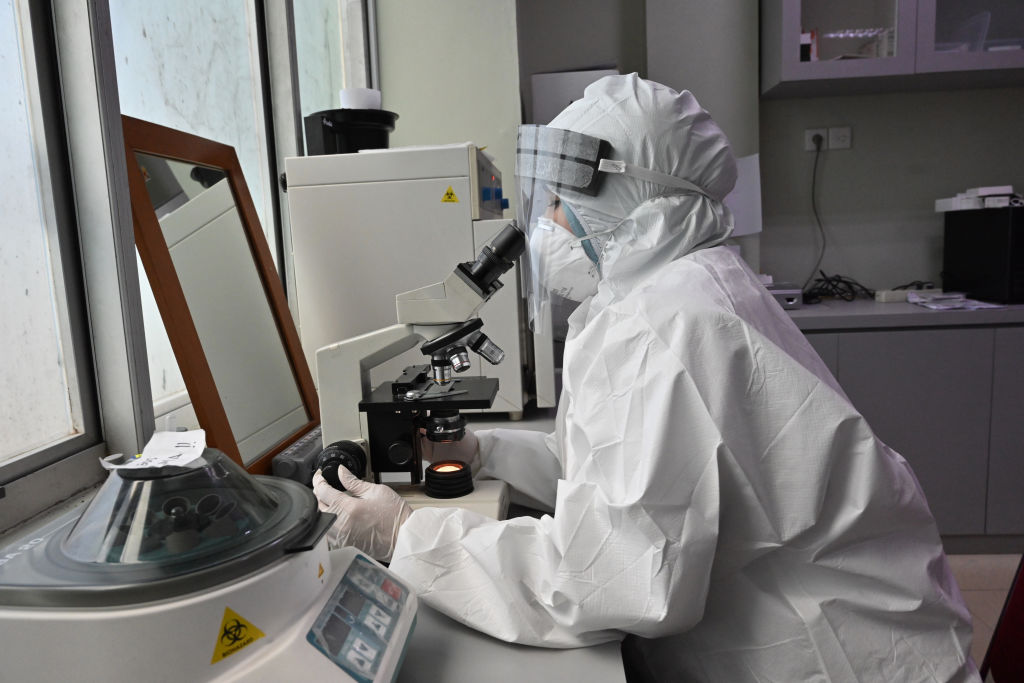Conclusions about coronavirus mutations 'are overblown,' scientist says


A free daily email with the biggest news stories of the day – and the best features from TheWeek.com
You are now subscribed
Your newsletter sign-up was successful
Scientists are probably exhausted from having to explain that new studies on the coronavirus are far from a sure thing, but, thankfully, they keep setting the record straight anyway.
The latest study to cause a stir came from from a team at Los Alamos National Laboratory. The Los Angeles Times published a report on the paper, which concluded that the COVID-19 coronavirus mutated into a more transmissible (albeit, not necessarily more dangerous) form that is more prevalent in hot spots. The research team, led by Bette Kober, is well-regarded and many of colleagues consider the theory plausible, The Atlantic reports, but that doesn't mean it's likely.
Lisa Gralinksi at the University of North Carolina, one of the few scientists in the world who specializes in coronaviruses, said the conclusions from the paper "are overblown" because they haven't actually been tested. There could be a lot of reasons why the viruses with the mutation are more prevalent, but the simplest is that they just happened to be the ones that got out of China at a higher rate.
The Week
Escape your echo chamber. Get the facts behind the news, plus analysis from multiple perspectives.

Sign up for The Week's Free Newsletters
From our morning news briefing to a weekly Good News Newsletter, get the best of The Week delivered directly to your inbox.
From our morning news briefing to a weekly Good News Newsletter, get the best of The Week delivered directly to your inbox.
Throughout the pandemic, there's been a lot of speculation about mutations creating different strains of the coronavirus that could vary in transmissibility or even lethality, but The Atlantic notes that many mutations are silent and just alter the viruses' appearance, not their functionality. Indeed, several experts said they'd be surprised if the coronavirus had morphed into more than one strain already, since that family of viruses changes at a much slower rate than, say, influenza viruses.
Regardless, Nathan Graubaugh at Yale School of Medicine, who believes there's probably just one strain floating around, thinks focusing too much on mutations "creates a diversion from what we need to be focusing on," including testing vaccines and drugs. Read more at The Atlantic.
A free daily email with the biggest news stories of the day – and the best features from TheWeek.com
Tim is a staff writer at The Week and has contributed to Bedford and Bowery and The New York Transatlantic. He is a graduate of Occidental College and NYU's journalism school. Tim enjoys writing about baseball, Europe, and extinct megafauna. He lives in New York City.
-
 Health insurance: Premiums soar as ACA subsidies end
Health insurance: Premiums soar as ACA subsidies endFeature 1.4 million people have dropped coverage
-
 Anthropic: AI triggers the ‘SaaSpocalypse’
Anthropic: AI triggers the ‘SaaSpocalypse’Feature A grim reaper for software services?
-
 NIH director Bhattacharya tapped as acting CDC head
NIH director Bhattacharya tapped as acting CDC headSpeed Read Jay Bhattacharya, a critic of the CDC’s Covid-19 response, will now lead the Centers for Disease Control and Prevention
-
 Blue Origin launches Mars probes in NASA debut
Blue Origin launches Mars probes in NASA debutSpeed Read The New Glenn rocket is carrying small twin spacecraft toward Mars as part of NASA’s Escapade mission
-
 Dinosaurs were thriving before asteroid, study finds
Dinosaurs were thriving before asteroid, study findsSpeed Read The dinosaurs would not have gone extinct if not for the asteroid
-
 SpaceX breaks Starship losing streak in 10th test
SpaceX breaks Starship losing streak in 10th testspeed read The Starship rocket's test flight was largely successful, deploying eight dummy satellites during its hour in space
-
 Rabbits with 'horns' sighted across Colorado
Rabbits with 'horns' sighted across Coloradospeed read These creatures are infected with the 'mostly harmless' Shope papilloma virus
-
 Lithium shows promise in Alzheimer's study
Lithium shows promise in Alzheimer's studySpeed Read Potential new treatments could use small amounts of the common metal
-
 Scientists discover cause of massive sea star die-off
Scientists discover cause of massive sea star die-offSpeed Read A bacteria related to cholera has been found responsible for the deaths of more than 5 billion sea stars
-
 'Thriving' ecosystem found 30,000 feet undersea
'Thriving' ecosystem found 30,000 feet underseaSpeed Read Researchers discovered communities of creatures living in frigid, pitch-black waters under high pressure
-
 New York plans first nuclear plant in 36 years
New York plans first nuclear plant in 36 yearsSpeed Read The plant, to be constructed somewhere in upstate New York, will produce enough energy to power a million homes
